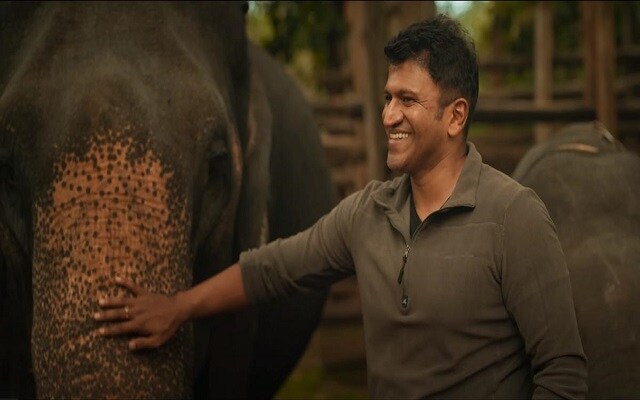Unlike his father’s film, however, this is not a masala film. It is a mix of a travel vlog and a documentary — striking a wonderful balance to make the film an immersive experience. While this is a passion project, the cinematic experience is equal to any commercial film. Cinematography, music, and editing come together to make this film entertaining and educational at the same time.
What really works in Gandhada Gudi, is the fact that the film doesn’t take on a preachy stand. Puneeth travels through Gajanoor, BRT Tiger Reserve, Nethrani Islands, Malenadu, Bellary, and Deccan. Each place that we travel to along with Puneeth opens us up to the different kinds of lives that are present around us. It is poetic, that the film was released ahead of his first death anniversary and it speaks of the circle of life.
Puneeth starts by speaking of the 250 year old halagu tree that was his father’s favourite place to relax under. He speaks of his grandfather’s first property, and even the period in their lives when Rajkumar was held prisoner by Veerappan, the infamous bandit. In parallel, Puneeth also explores the natural habitat of Karnataka. The brilliant transitions are effective because of great background score, and voice over narration that is lyrical.
It is this music, and the cinematography that truly immortalises Puneeth Rajkumar’s every smile. What began as a superstar exploring the legacy of his later superstar father has now transformed into a memoir of sorts.
Another interesting detail regarding Gandhada Gudi is how Puneeth momentarily sheds his superstardom. The audience get to see a side of him that has not been visible in his films. Be it his fear of snakes, or his fascination with camping in the wild, he is like a child who has been handed over his favourite toy to play with. What began as a superstar exploring the legacy of his later superstar father has now transformed into a memoir of sorts.
He puts himself in the backseat, and allows us to see his fears. This is a slice of Appu, the person on screen. The superstar only lurks under the surface, never taking over from Appu who intrigues us with his story. Puneeth also explores the damage that humans have done to nature. It is also good to see him place himself along with other humans as a part of the problem. Dialogues and sentiments such as “ The only thing that attacks anything is human”, “Humans have to find a solution to the problem that they created”, or even Puneeth addressing his fans in Uttar Kannada directly when he says, “As important as Tungabhadra is to Uttar Kannada, the people here are important to me,” add value to the scenes.
Audiences also enjoy such references, especially since such dialogues are also combined with thoughtful intercuts that is a call back to his father. The film is an interesting portrayal of human damage, taking responsibility for it, looking for hope. The inclusion of Nethrani Islands by Amoghavarsha is an indication of how even in the darkest times, it is necessary to look for hope. In fact, Amoghavarsha quotes Jurassic Park and says the island captures the essence of the phrase, “Nature will find its way back.”
Puneeth’s curiosity about his state, the ecosystem and the animal life that lives in this ecosystem is child like. It is also relatable and is one of the reasons the film is immersive. Another reason, as earlier stated is the brilliant combination of camera work, editing and music. For instance, one scene sees camera angle that flows like water as it captures the element from high up until it reaches the sea. The majestic and inspiring visuals are no lesser than a masala movie. Theatre erupts in whistles and claps. Even more so when Puneeth says “Kadal indha nadhi, nadhi indha Kadal.” This is the natural law of life and it rings different now in Puneeth’s absence as it speaks of circle of life.
To understand where we live, to understand how we effect our surroundings, and to choose sustainability every time is the central crux of the film which refuses to speak about the politics of environmentalism, and instead addresses individuals and urges them to take responsibility where needed.
Director: Amoghavarsha
Cast: Amoghavarsha, Puneeth Rajkumar
Rating: 3.5
Priyanka Sundar is a film journalist who covers films and series of different languages with special focus on identity and gender politics.

